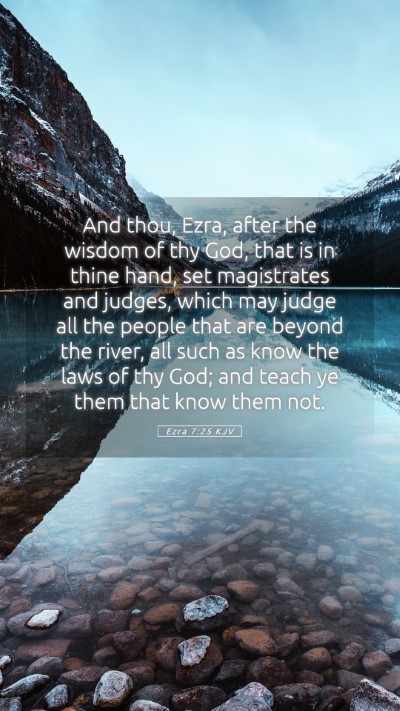Old Testament
Genesis Exodus Leviticus Numbers Deuteronomy Joshua Judges Ruth 1 Samuel 2 Samuel 1 Kings 2 Kings 1 Chronicles 2 Chronicles Ezra Nehemiah Esther Job Psalms Proverbs Ecclesiastes Song of Solomon Isaiah Jeremiah Lamentations Ezekiel Daniel Hosea Joel Amos Obadiah Jonah Micah Nahum Habakkuk Zephaniah Haggai Zechariah MalachiEzra 7:25 Meaning
What is the meaning of Ezra 7:25?
And thou, Ezra, after the wisdom of thy God, that is in thine hand, set magistrates and judges, which may judge all the people that are beyond the river, all such as know the laws of thy God; and teach ye them that know them not.
Ezra 7:25 Bible Verse Meaning
Understanding Ezra 7:25
Ezra 7:25 reads: "And you, Ezra, according to the wisdom of your God that is in your hand, appoint magistrates and judges who may judge all the people in the province beyond the River, all such as know the laws of your God; and those who do not know them, you shall teach." This verse highlights Ezra’s role in teaching the Law of God and appointing authorities to uphold it. Below, we delve into the bible verse meanings, bible verse interpretations, and bible verse understanding as drawn from various public domain commentaries.
Analysis of Ezra 7:25
This verse has significant implications for both Ezra and the Jewish community. Below are some pivotal themes extracted from the verse:
-
The Wisdom of God:
Ezra is acknowledged for his wisdom, which is attributed to God. Commentators such as Matthew Henry emphasize that true wisdom comes from a relationship with God, implying that spiritual insight is paramount for leadership.
-
Appointment of Judges:
Ezra is instructed to appoint magistrates and judges to ensure justice and adherence to God's laws. Albert Barnes notes that this move is essential for establishing order and righteousness in the community.
-
Teaching the Law:
The latter part of the verse stresses the necessity of educating those who are unfamiliar with God's laws. As commented by Adam Clarke, this reflects a commitment to discipleship and the propagation of God's word among the people.
Teaching Roles in Biblical Context
Ezra exemplifies the role of a teacher and leader in a community shaped by divine principles:
-
Leadership through Knowledge:
Effective leaders must not only be knowledgeable but also capable of imparting wisdom to others. This aligns with Bible study insights on the importance of understanding Scripture as a foundational element of Christian leadership.
-
The Law as a Guiding Principle:
By disseminating knowledge of God's law, Ezra positions himself as a catalyst for spiritual renewal and societal reform, promoting a culture of divine obedience.
Application of Ezra 7:25 in Modern Life
Understanding Scripture today involves applying ancient principles to contemporary issues. Below are practical applications stemming from this verse:
-
Engagement with Scripture:
Believers are encouraged to engage deeply with Scripture, gaining the wisdom that Ezra had. Through structured Bible study groups or online Bible study, individuals can cultivate their understanding.
-
Community Leadership:
Just as Ezra assumed leadership in accordance with God's will, today's leaders are called to guide their communities towards righteousness based on biblical teachings.
Cross-References Related to Ezra 7:25
This verse connects with various parts of the Bible, enhancing its meaning and context:
- Deuteronomy 1:13: Selection of wise leaders for the community.
- 2 Chronicles 17:7-9: Jehoshaphat’s appointment of teachers to instruct the people.
- 1 Timothy 3:1-7: Qualifications for elders and overseers in the church.
Conclusion
In conclusion, Ezra 7:25 serves as a rich source for bible verse commentary and biblical exegesis, illustrating critical themes of leadership, wisdom, and the imperative of guiding one's community in the knowledge of God's law. This verse challenges us to reflect on how we can embody these principles in our own lives and communities.


